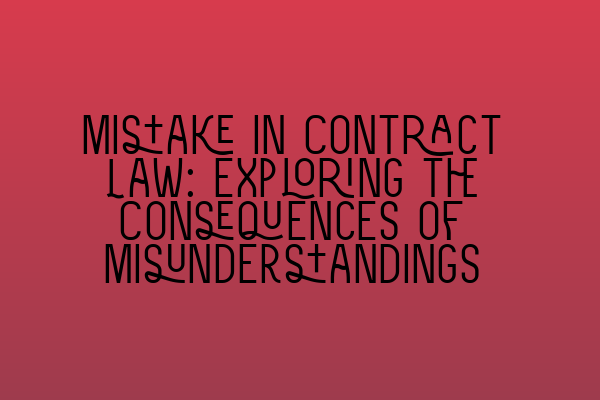Mistake in Contract Law: Exploring the Consequences of Misunderstandings
In the world of contract law, mistakes can have significant consequences. When parties enter into a contract, it is important for both sides to have a clear understanding of the terms and conditions. However, misunderstandings can arise, leading to potential legal disputes. In this blog post, we will delve into the concept of mistake in contract law, exploring its various types and the implications they can have.
Types of Mistakes in Contract Law
1. Mutual Mistake:
A mutual mistake occurs when both parties to a contract share the same erroneous belief about an important fact. For example, consider a situation where two parties agree to enter into a contract for the sale of a rare painting. Unbeknownst to both parties, the painting is a replica, not the original artwork. In such a case, the contract may be voidable if the mutual mistake is significant enough to undermine the purpose of the agreement.
2. Unilateral Mistake:
Unlike mutual mistakes, a unilateral mistake only affects one party to the contract. This situation arises when one party misunderstands a material aspect of the agreement. Generally, a unilateral mistake may not provide grounds for invalidating a contract unless it was caused by the other party’s fraudulent misrepresentation or the mistaken party is in a position of vulnerability.
3. Mistake of Fact:
Mistake of fact arises when one or both parties have an incorrect understanding of the facts surrounding the agreement. This type of mistake can either be mutual or unilateral. For instance, if a buyer agrees to purchase a car, believing it to be in excellent condition, but later discovers that it has undisclosed serious mechanical issues, a mistake of fact may be present. In such instances, the aggrieved party may seek remedies to rectify the contract, such as rescission or damages.
Consequences of Mistake in Contract Law
When a mistake is found to exist in a contract, different consequences may follow, depending on the type of mistake and the applicable legal principles. Here are a few possible outcomes:
1. Rescission:
Rescission involves the cancellation of a contract due to the existence of a mistake. In cases of mutual mistake, the contract may be voidable, allowing the parties to be released from their obligations. In unilateral mistake situations, rescission may only be granted if the other party knew or should have known about the mistake.
2. Reformation:
Reformation aims to correct a mistake in a contract by rewriting its terms to reflect the intention of the parties accurately. This remedy is often sought in cases where the mistake is clear, and it can be shown that the agreement does not reflect the true intentions of the parties.
3. Damages:
When a mistake leads to financial losses or damages, the aggrieved party may be entitled to seek compensation. Damages awarded will depend on the nature and extent of the harm suffered due to the mistake. It is important to consult with legal professionals to understand your rights and the potential remedies available in your particular situation.
Addressing Mistakes: Prevention and Resolution
To avoid the potential consequences that mistakes can have on contracts, it is crucial to take proactive steps.
1. Drafting Clear and Comprehensive Contracts:
When creating a contract, ensure that the terms and conditions are clearly specified, leaving no room for misinterpretation. Ambiguities and uncertainties in agreements can increase the risk of mistakes and subsequent disputes.
2. Thorough Due Diligence:
Before entering into any agreement, conduct thorough research and due diligence. This includes verifying the facts, understanding the subject matter, and uncovering any potential issues that may impact the contract’s validity or performance.
3. Seek Professional Assistance:
Engaging the services of a qualified contract law solicitor is essential in ensuring that your contracts are legally sound and free from mistakes. Their expertise and attention to detail can help prevent misinterpretations and misunderstandings that could lead to future disputes.
Conclusion
Mistakes in contract law can have wide-ranging consequences, affecting the rights and obligations of the parties involved. By understanding the different types of mistakes and taking the necessary precautions during contract formation, individuals and businesses can minimize the risks associated with misunderstandings. In cases where mistakes do occur, consulting with legal professionals can help navigate the complexities of contract law and find appropriate resolutions.
Remember, contract law is a complex field, and the information provided in this blog post is intended for general guidance only. For advice tailored to your specific circumstances, always seek the assistance of an experienced contract law solicitor.
If you have any questions or need legal assistance with contract matters, contact SQE Contract Law today. Our team of skilled solicitors is here to help you navigate the intricacies of contract law and provide comprehensive solutions to protect your interests.
